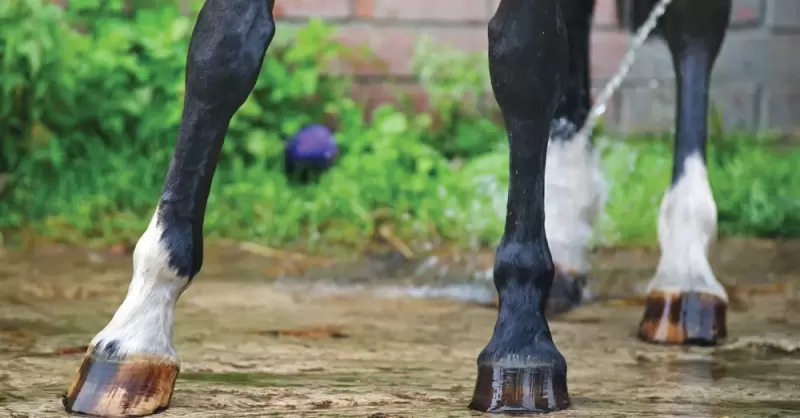Many people among us still wonder what is ringbone in horses. Ringbone, a common ailment among horses, refers to a degenerative condition affecting the bones within a horse’s hoof. This condition can significantly impact a horse’s mobility and comfort. Delving into the causes, symptoms, and management of ringbone sheds light on this prevalent equine health concern.
What Is Ringbone In Horses?
Ringbone in horses encompasses two primary types: high and low. High ringbone affects the pastern joint (proximal interphalangeal joint), while low ringbone affects the coffin joint (distal interphalangeal joint), both leading to degeneration and bony growths around the affected joint.
Also Read : What Is A Confidential Marriage License?
Causes and Risk Factors
1. Wear and Tear: Repetitive stress, trauma, or excessive wear on the joint can contribute to the development of ringbone.
2. Conformational Issues: Poor limb conformation or structural abnormalities may predispose a horse to developing ringbone.
3. Age and Activity Level: Older horses and those engaged in strenuous activities might be more susceptible to ringbone.
Also Read : What Is Hondashi?
Symptoms and Identification
1. Lameness: A horse affected by ringbone typically exhibits lameness, which might worsen with exercise or movement.
2. Swelling and Heat: Swelling, heat, and tenderness around the affected joint are common symptoms.
3. Reduced Range of Motion: Restricted movement or stiffness in the affected limb is often observed.
Diagnosis and Management
1. Veterinary Evaluation: A veterinarian conducts a physical examination and may use diagnostic tools like X-rays to confirm the presence and severity of ringbone.
2. Treatment Approach: Management includes a combination of rest, anti-inflammatory medication, corrective shoeing, and, in some cases, surgical intervention.
3. Lifestyle Modifications: Adjustments in exercise routines, providing supportive care, and maintaining proper hoof care aid in managing the condition.
Prognosis and Care
1. Varied Prognosis: The prognosis for ringbone can vary based on the severity, location, and response to treatment.
2. Long-Term Care: While ringbone might not be curable, proper management and veterinary care can help alleviate symptoms and improve a horse’s quality of life.
3. Consultation with Professionals: Consulting with equine veterinarians and farriers can aid in formulating an appropriate care plan for affected horses.
To read about more informational things you have to visit ranyy.com
FAQ
Can Ringbone In Horses Be Cured?
Ringbone, like other forms of arthritis, is a progressive and degenerative disease with no cure and must be managed. Coming up with a treatment plan with both your veterinarian and farrier, will give your horse the best chance at staying comfortable and sound for as long as possible.
Can A Horse With Ringbone Be Ridden?
Ringbone is incurable and progressive. Most horses can be kept comfortable for light riding or a reduced workload. Horses suffering from advanced ringbone may need to retire from sport or work life. In some cases, horses with ringbone can no longer withstand being ridden.
What Causes Ringbone In A Horse?
An arthritic, degenerative disease of the pastern and coffin joints, ringbone comes in two types. High ringbone affects the pastern, and low ringbone affects the coffin. Similar to arthritis in people, ringbone develops in our equine counterparts from causes such as injury, infection, and normal wear and tear.
Can A Horse Be Sound With Ringbone?
Research has shown that 2 out of 3 horses with ringbone of the forelimbs and greater than 4 out of 5 horses with hindlimbs affected will be sound enough for athletic use with surgical fusion.
Conclusion
Ringbone poses a significant concern in equine health, impacting a horse’s mobility and comfort. Recognizing the causes, symptoms, and management strategies for ringbone enables horse owners and caretakers to provide appropriate care, emphasizing the importance of early detection and comprehensive management to support affected horses.
Understanding the nuances of ringbone aids in proactive management, emphasizing the significance of veterinary intervention, proper care, and lifestyle modifications in maintaining the well-being of horses affected by this degenerative condition.
I have addressed all the queries and topics mentioned below mentioned in this article
what is mac mcclung vertical leap
what is mac mcclung vertical?
what is mac mcclung vertical jump
how long can a horse live with ringbone
photos of ringbone in horses
What is ringbone in horses treatment
What is ringbone in horses symptoms
What is ringbone in horses surgery
What is ringbone in horses pictures
What is ringbone in horses pain
What is ringbone in horses causes
